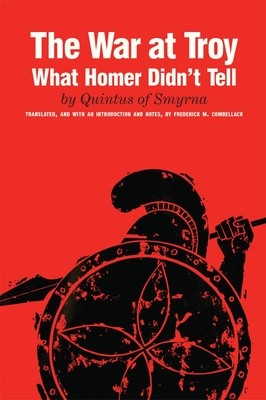
- We will send in 10–14 business days.
- Author: Quintas of Smryna
- Publisher: University of Oklahoma Press
- ISBN-10: 0806148160
- ISBN-13: 9780806148168
- Format: 15.2 x 22.9 x 1.7 cm, softcover
- Language: English
- SAVE -10% with code: EXTRA
Reviews
Description
Homer's great epic poems, the Iliad and the Odyssey, are widely read and enjoyed both in the original Greek and in translations, but many readers have felt, with reason, that the Iliad is incomplete. It ends when Achilles is still alive and Troy is still uncaptured. And the Odyssey begins with the departure of the Greek army from Troy. The omission caused no problem in Homer's time, for the story was well known, but as the centuries passed something was needed to fill the gap. Undoubtedly, Quintus of Smyrna wrote his chronicle for that very purpose.
Quintus' epic, written probably in the third century after Christ, is the only extant literary work from antiquity that gives a connected account of the events of the Trojan War. It tells what happened to Achilles and to Troy, and of the fatal enterprises of the Queen of the Amazons and the King of Ethiopia, the funeral games held in honor of Achilles, the victory of Odysseus in his contest with Aias, the death of Paris, the strategy of the wooden horse, and the capture and sack of Troy. Translator and editor Frederick M. Combellack's goal was to "provide a version of Quintus in English prose suitable for our own time." The only previous English version, published a hundred years ago, was in a "kind of blank verse, in a style now out of fashion." Combellack's accurate, readable prose translation retains the spirit of Quintus' tale. The War at Troy: What Homer Didn't Tell is essential reading for scholars and readers interested in the heroic age and the epics that celebrate it.EXTRA 10 % discount with code: EXTRA
The promotion ends in 15d.21:36:52
The discount code is valid when purchasing from 10 €. Discounts do not stack.
- Author: Quintas of Smryna
- Publisher: University of Oklahoma Press
- ISBN-10: 0806148160
- ISBN-13: 9780806148168
- Format: 15.2 x 22.9 x 1.7 cm, softcover
- Language: English English
Homer's great epic poems, the Iliad and the Odyssey, are widely read and enjoyed both in the original Greek and in translations, but many readers have felt, with reason, that the Iliad is incomplete. It ends when Achilles is still alive and Troy is still uncaptured. And the Odyssey begins with the departure of the Greek army from Troy. The omission caused no problem in Homer's time, for the story was well known, but as the centuries passed something was needed to fill the gap. Undoubtedly, Quintus of Smyrna wrote his chronicle for that very purpose.
Quintus' epic, written probably in the third century after Christ, is the only extant literary work from antiquity that gives a connected account of the events of the Trojan War. It tells what happened to Achilles and to Troy, and of the fatal enterprises of the Queen of the Amazons and the King of Ethiopia, the funeral games held in honor of Achilles, the victory of Odysseus in his contest with Aias, the death of Paris, the strategy of the wooden horse, and the capture and sack of Troy. Translator and editor Frederick M. Combellack's goal was to "provide a version of Quintus in English prose suitable for our own time." The only previous English version, published a hundred years ago, was in a "kind of blank verse, in a style now out of fashion." Combellack's accurate, readable prose translation retains the spirit of Quintus' tale. The War at Troy: What Homer Didn't Tell is essential reading for scholars and readers interested in the heroic age and the epics that celebrate it.

Reviews